NEW YORK (CNN/Money) -
So you don't have three exes, millions of dollars in off-shore accounts and a business in Bermuda. That doesn't mean you actually want to do your taxes, or that they're not complicated.
No siree. You'd much rather others crunch the numbers for you. After all, you figure tax preparers know more than you about maximizing your refund -- or minimizing your tax liability. And you assume they know all sorts of little tricks
But what qualifies someone to be a tax preparer? The answer is: A lot, a little or nothing at all. In fact, in most places, it's easier to hang out a shingle declaring yourself a tax preparer than it is to set up shop as a beautician.
| More tax help
|

|
|
|
|
With the exception of two states (California and Oregon), "there aren't any licensing requirements for tax preparers," said Cindy Hockenberry, spokesperson for the National Association of Tax Professionals.
And even if your tax preparer has excellent credentials, that alone doesn't guarantee good service. Much also depends on the attention you get, the experience and ethics of the preparer and how much you're charged.
Here's a quick guide to help you assess your tax preparer.
Check credentials
First, find out what kind of experience and accreditation your tax preparer has.
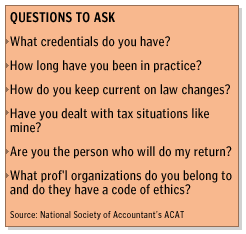
Ask about his education in tax and accounting issues and what licenses or certifications he holds. (To learn what a tax preparer has to do to earn various designations, click on the following: certified public accountant (CPA); tax attorney; enrolled agent (EA); accredited tax preparer (ATP); accredited tax advisor (ATA); or "tax pro" at H&R Block.)
If you're concerned about being audited, keep in mind that only attorneys, CPAs and EAs are allowed to represent you before the IRS.
Know what you're paying for
Just as the creditentials of tax preparers fall within a wide range, so, too, do their fees.
Generally, how much you're charged will depend on how complicated your tax situation is and how many forms and schedules you need completed.
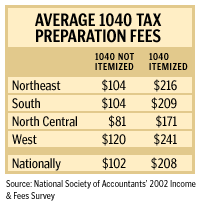
What's more, accountants who work for big firms are likely to charge more than those working independently; and those working in high cost-of-living areas are likely to charge more than those working in small cities or towns.
For instance, Ginger Broderick, an independent New York City-based CPA and a member of the New York State Society of CPAs, charges a base fee of $350 during tax season for clients with relatively straightforward tax situations.
Generally that includes three things: a basic federal tax return with up to three attached schedules; a state tax return; plus an hour of general tax planning with the client at some other point during the year. CPAs just beginning to build their business might do the same for $250, she said.
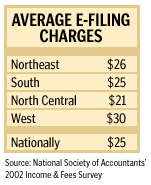
For clients whose tax situations are more complex and whose returns might take 10 hours to 20 hours to complete (including time spent meeting with the client), she might charge $1,500 to $2,500.
A large firm Broderick used to work for charged clients a base fee of $750 regardless of how straightforward their returns were, while other city firms, intent on attracting wealthy clients, might set a base at $2,000, she said.
Meanwhile, at H&R Block, the average cost of a client's 2001 return was $122. That included a basic federal return, a state return and possibly one attached schedule, all prepared in-office, said company spokesman Denise Sposato.
Find out who's preparing your return
If you opt for a CPA, you may think she will devote mind, body and soul to your tax return. That's not necessarily the case if she works for a large firm or has a brisk tax-preparation business and a staff. In that case, she may delegate the number-crunching to subordinates, who themselves might be training to be accountants or at least have college degrees in accounting. (It's worth asking.)
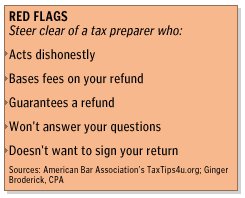
At the very least, your CPA should speak with you first to discuss the tax materials you're submitting and then she should review her subordinates' work before signing your return.
And she should be available to answer questions. Broderick said generally your tax preparer should get back to you within 48 hours. If it's high tax season, however, you might need to put in a second call, she said. But, she added, "the larger firms have more of the talent sitting at the desk ready to take the phone call."
Watch for errors
Regardless of how credentialed your tax preparer is, always check for mistakes on your completed return.
For the 2001 tax year, the IRS found there were 6 million mistakes on returns signed by paid preparers versus 8.5 million on returns prepared by taxpayers themselves.
And not all preparers err equally.
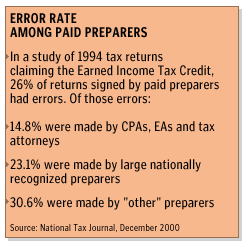
In a study of 1994 federal returns on which the earned income tax credit was claimed, of those returns with errors that were signed by paid preparers, CPAs, EAs and tax attorneys had the lowest error rate (14.8 percent); paid preparers at large, nationally recognized tax-prep services had the next highest rate (23.1 percent) and preparers classified as "other" had the highest rate (30.6 percent).
Statistics aside, no matter who you use, just remember you're liable for the information on your return.
So steer clear of preparers who encourage you to make up amounts for deductible items or guarantee you'll get a refund at least as large as their fee. No such guarantee can be made since you may only take those deductions and credits for which you're legally eligible.
"You're responsible for what's on the return. ... Look through it and make sure it looks right," IRS spokesman Don Roberts advised.

|

